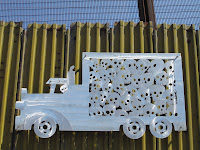
This semester's Border Studies program began seven days ago, yet it seems like we've all been here for several weeks. Last Wednesday, students from various schools around the country found ourselves in Tucson, AZ at BorderLinks, an organization that leads groups of students on trips around the borderlands. We stayed there for a few days, getting to know each other and learning about the next four months of our lives.
There are fourteen of us--thirteen women and one guy--as well as three instructors who will be teaching our classes and leading the program. We all come from different parts of the U.S. (and also Bosnia), and a variety of schools as well. While we're in Tucson, we'll all be living with different host families and working for a variety of organizations in and around Tucson.
On day three, we left early in the morning and headed South to Nogales, Sonora. We stopped briefly in Nogales, AZ, which almost already seemed like Mexico. Everyone spoke Spanish and seemed surprised to see our large group of backpack-carrying college kids. In our big, white vans, we crossed the border into Mexico, entering an entirely new world. Many of the buildings were falling apart, trash littered the ground, and people stared at us as we drove through the town.
We first went to see the muro, the wall that divides Nogales, Mexico and Nogales, AZ. It was shocking. Made out of concrete, metal, and barbed wire, the wall appeared to be not only a barrier, but a symbol of despair and devastation. It was literally in someone's backyard. We visited the wall not only to see its role as such a harsh, tangible barrier, but also to view the paintings and murals that many artists have placed on the wall. There was graffiti, as well as professional art, and both expressed the feelings from Mexico regarding the wall.
After, we went to the cultural center to meet with Guadalupe and Diego, two artists that helped start the border art movement in 2003. Their work was incredible and inspiring; they were combing something they love with one of North America's most complicated debates.
From there we met Kiko, a community activist who used to work and help manage a maquiladdora, an American-owned company that operates along the Mexican side of the border. A few years ago, Kiko started a daycare in a community where it was much needed. He lives in "Colonio Kennedy", Nogales' strikingly wealthy neighborhood, but his experiences would suggest otherwise. From Kiko we learned that the workers in the maquilas make $5-$8 a day. When he was a manager, he tried to change the system and raise the workers' wages, but the maquila association forbit it. Unlike all other business and homes in Mexico, maquilas, being American-owned, are exempt from paying taxes to the city of Nogales. In fact, Nogales' government even spends its tax dollars on improving the raods and scenery around the maquilas to entice the companies to have their business here. Without this added privilege, the maquilas would move their businesses to other countries where the labor is even cheaper. Thus, while the maquilas are providng jobs, the workers are barely making enough money to survive on their own, let alone support their families.
We then went to lunch in a small neighborhood called Flores Magon, where Maria Cruz, a BorderLinks volunteer and community activist, lives. The town was almost shocking. It was difficult to remember that this is the way most of the world lives; the way we Americans live is both a privilege and a rarity. This woman was joyous and spoke of how she is involved in politics and her community. She lives a very modest lifestyle, yet served us all lunch. Many of the homes in the community had neither electricity nor running water, no paved roads nor sidewalks, and several houses shared a rundown outhouse. We were just miles from the border, yet the living situation was unbelievably different.
Next, we met with Rosario, a materials manager at Curtis--one of Nogales' many maquilas. She boasted of the high wages ($7 a day) her employees receive, and considers maquilas a blessing for Nogales. We walked around the factory and noticed that most of the employees were women; their fingers are small and nimble, therefore they are often more efficient. Rosario explained that the workers receive bonuses (maybe a dollar if they've reached 150%) based on their productivity levels, and that they all work 10 hours a day, 5 days a week.
We ended the day at El Hogar de Paz y Esperanza, the home of peace and hope. It serves as both a community center, part-time school, and hostel for travelers. The family who runs it was incredibly sweet and enthusiastic for life. They made us a fabulous dinner and breakfast, showed us around the place, and even played music for us.
In the morning, we packed up and headed to the border. This time, Katie, Jeff, and Riley had us cross the border on foot and take shuttles from Nogales, AZ back to Tucson. We met a few people on the ride, and it was interesting to see how many people travel across the border. While at the crossing, we saw two women get arrested, as well as a huge WANTED poster, with just a few photos stamped in red with "CAPTURED". It was distburbing. The highway from the border to Tucson is equipped with a few mandatory checkpoints that ask for ID and often search vehicles. That doesn't really sound legal, does it? The borderlands live by a different set of rules...
The adventures and learning process continue!


























